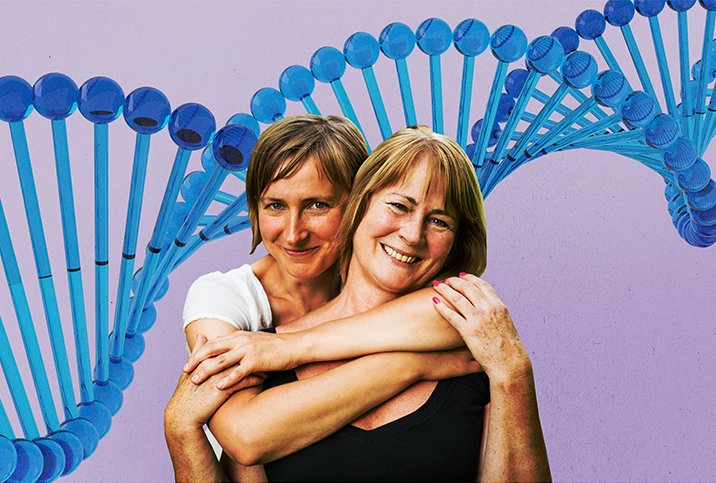5 Traits You Probably Got From Your Parents—Besides Eye Color

According to Martin Schiller, Ph.D., executive director of the Nevada Institute of Personalized Medicine at the University of Nevada, Las Vegas, whether you're talking about a trait, behavior or disease, it's partially inherited and partially the result of your environment. So how do scientists figure out what is inherited and what's influenced by external factors?
Schiller said geneticists estimate the breakdown by doing pedigree and twin heritability studies. As it sounds, these studies are conducted on identical or fraternal twins. They aim to work out how much of a trait, behavior or disease comes down to:
- Heritability (genetics)
- Shared environment (things that happen to both twins and affect them equally)
- Non-shared environment (things that happen to one twin and not the other or affect each twin differently)
Nathan A. Gillespie, Ph.D., is an associate professor at the Virginia Institute for Psychiatric and Behavioral Genetics and in the department of psychiatry at Virginia Commonwealth University School of Medicine in Richmond, Virginia. Gillespie explained scientists can look at a trait and give it a percentage of heritability by analyzing the data collected on extensive twin databases. "We can estimate with relative precision how much a trait is genetic," he said.
But why is this useful? Well, it tells us how much to consider genetics in specific situations. For example, in health care, the heritability of things like cardiovascular disease provides insight into how much family history may predict patient outcomes.
The genetic architecture of traits and diseases
Before delving into the weird and wonderful things you may have inherited from your parents, Schiller explained more about genetic architecture.
"In some cases, people have what is called a Mendelian trait or disease," Schiller noted.
Mendelian traits are passed down by dominant and recessive alleles of one gene. An allele is one of two or more versions of a gene.
"This one allele has a really large effect," he said. "Examples of Mendelian traits and diseases are blood type, hair color, Parkinson's disease or familial Alzheimer's."
However, most common traits have many genes that contribute.
"For example, height comes from over 1,000 genes and depends on which set you got from each parent," Schiller explained. "It doesn't directly come from one parent. Most common traits or diseases have a genetic architecture with hundreds of genes involved. That's why you can have siblings whose heights vary greatly."
With that brief introduction to genetics, let's get to the fun stuff and look at some common inherited traits.
1. Your hatred for cilantro
Cilantro (or coriander for the Europeans reading) has a taste some people really hate, even going so far as to equating it to the taste of soap. There's a reason for the die-hard stance. You guessed it—it's because of your genetics.
Gillespie described an annual twin conference where researchers ran tests on all sorts of flavors, such as citric acid, sugar, ethanol, Galaxolide, cinnamon, cilantro and basil.
"What they found was that heritability for these taste sensations ranged from 40 to 70 percent," Gillespie said.
An article published in the journal BioMed Central discussed cilantro's soapy taste to some people stems from genetic variants in olfactory receptors. In particular, an olfactory receptor gene named OR6A2—a gene involved in sensing smells.
Of course, other factors can influence your preference for cilantro, too, such as whether your parents steeped your favorite childhood dishes in cilantro.
2. A fear of heights
We often assume a phobia comes from a bad experience or the influence of a friend or family member who has that same phobia. There is an inheritability element, though.
Gillespie discussed one twin study that looked at 21 different phobias, including a fear of heights. The researchers found that two-thirds of these fears had moderate heritability, between 30 percent to 50 percent. But why are these fears heritable?
"Well, something like a fear of snakes or heights is really adaptive," Gillespie said. "It stops you from doing anything dangerous to keep you safe."
Essentially, you are the product of the genetics of your more rural ancestors, who were exposed to the elements, nature and other primal dangers.
3. Your attractiveness, masculinity or femininity
Gillespie referenced an Australian twin study published in the journal Behavioral Genetics, which looked at the inheritability of human facial attractiveness, facial masculinity and femininity.
"Lo and behold, all these traits were quite strongly heritable," Gillespie said.
The study showed the inheritability of attractiveness was between 50 percent to 70 percent, and masculinity and femininity were around 40 percent to 50 percent. Interestingly, those genetic influences are shared across sexes.
"So, there's a neat crossover," Gillespie continued. "Attractive fathers will not just have attractive sons, but attractive daughters, too. And attractive mothers will have both attractive sons and daughters."
4. How wet or dry your earwax is
"Something you absolutely inherit from your parents is the stickiness of your earwax," Schiller said.
Your earwax type is an example of a Mendelian trait—that is, it's controlled by one gene with two alleles.
The type of earwax you have derives from the ABCC11 gene. There are a couple of variants of this gene. One, the more dominant trait, means your earwax contains more fat, making it wet and sticky. The recessive trait means it has less fat, making it dry and flaky.
5. Infidelity—maybe, a little bit
A study in the United Kingdom looked at 1,600 unselected female twin pairs to research genetic influence on infidelity. The results, published in the journal Twin Research and Human Genetics, found infidelity and a person's number of sexual partners are moderately influenced by genetics (41 percent and 38 percent heritable, respectively.)
Another small study performed by researchers at Binghamton University in New York found that participants who had a specific gene called DRD4 were more likely to cheat.
However, you can't blame infidelity on your genes, as there are many different factors influencing a person's decision to cheat. Additionally, the amount of scientific evidence available is small and not strong enough to fully attribute infidelity to genetics.
The political gene?
If you're thinking you inherit every trait and that your genes control everything, Gillespie has some final words for you.
"There is only one thing I have come across that isn't heritable, and that's your behavior at the ballot box," he said. "Your vote may be influenced by your upbringing, shared experiences, parents and peers. However, what is definitely not genetic is the intensity with which you maintain or hold onto your political beliefs."

















